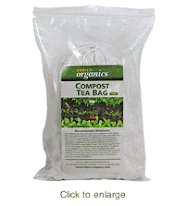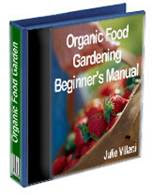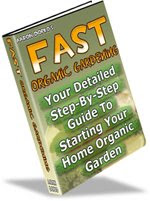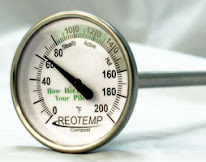Vermicompost is the best organic compost fertilizer you can make. This organic compost uses worms to make the compost. This process is the fast way in the winter months as the worms are aiding in the compost. Without the worms, one would be making organic compost by the outdoor method, only in-doors and possibly taking several months. It will be ready for spring gardening anyway. The organic compost you can make with worms in the winter can be ready in about 6 -8 weeks.
To get started you need 3 main ingredients: worms, a container or bin and "bedding". The Bin: The size of the bin should be according to your household's kitchen scraps. One or two people usually produce about 4 lb of food waste a week: use a 2ft x 2ft box 8" deep. For three people make it 12" deep, for more, 2ft x 3ft x 12" deep -- or two 2-person bins might be better, because bigger ones can be too heavy to move when full. The bins need a lid or cover. Ideally, the best bins are the Rubbermaid type plastic storage bins. But if you are handy, you can build one out of wood as well. For a small size, a 5 gallon bucket with a lid works well. Do not use any container that has had chemicals and toxins in them. Drill or punch enough holes in the bottom for light drainage or seepage, and on the sides for more ventilation. Use old bricks or a few pieces of wood to raise the bin off the floor for circulation. Place a tray or plastic under the bin the catch any seepage. Location is important. Ideally your worm compost bin should be where the temperature ranges between 40 to 80 degrees Fahrenheit. The red worms generally prefer temperatures between the 55 to 77 degree range. Many people use a corner of their kitchen, or, if they have a balcony or patio the worm bin can be outside, preferably in the sunshine and where it does not get chilly in the winter, or move it inside for the cold months.
The Bedding: Once you have made your bin, the compost layering, or bedding, will be similar to composting outdoors. Now, put about a foot of damp bedding made from any of these: shredded leaves, dried grass clippings, sawdust, and black topsoil, into the container to serve as a living space for the red worms. You can also use shredded cardboard and newspaper (must have non-toxic ink) as bedding material. Whatever material you choose, it has to be as moist as a wrung-out sponge and is no less than 8” deep. Proper bedding will take up anywhere from one-third to one-half of your bin. Save a bag of leaves, preferably mulched finely, to cover your kitchen scraps as they are added to the compost bin throughout the winter.
Add kitchen food scraps, tea bags, coffee grounds and coffee filters, ground egg shells, fruits and vegetables, peels, cores, breads, rice, pasta, and beans. Avoid meat scraps, fish bones, dairy products, potato peelings and garlic. Watermelon rinds can be difficult. You can set a small coffee can under the sink for scraps and empty it every 3-4 days into the compost bin.
The Worms: You will need red worms -- Eisenia foetida, also known as red wigglers, brandling or manure worms or Lumbricus rubellus which are manure worms. Many garden centers now supply them, and in most countries they can be bought by mail order from worm farms. Vermicompost consists mostly of worm casts (poop) plus some decayed organic matter. Worm casts contain five times more nitrogen, seven times more phosphorus, and 11 times more potassium than ordinary soil, the main minerals needed for plant growth, but the large numbers of beneficial soil micro-organisms in worm casts have at least as much to do with it. The casts are also rich in humic acids, which condition the soil, and have a perfect pH balance. Do not try using your garden-variety night crawlers. Some recommend a one-to-one ratio -- one pound of worms for one pound of garbage, while others recommend two pounds of worms for every pound of garbage. A pound of red wrigglers can consume half a pound of organic waste a day. Worms multiply rapidly and with proper feeding and a good home, they can double their population about every ninety days. Start out slow and with fewer worms than you think you'll need and the resulting worm population explosion will take care of the rest.
Worm casts have a pleasant, earthy smell, like forest soil. If the compost bin begins to smell, you have too much feed in it, more than the worms can process. Stop feeding the worms the kitchen scraps. Let me pile up in a small air tight container until needed. Add more dry bedding and stir the bin gently with your hands (using gloves). Just repeat until the smell is gone.
Don't let the vermicompost dry out before using it -- it loses a lot of its value. If you want to store it, don't use an airtight container and it will keep for a year or more. Use this rich organic compost fertilizer for your indoor house plants, herbs, indoor garden or store for use in your spring garden.
Organic composting and fertilizer is one more area of our lives to be green minded. We can do our part to keep organic waste recycled at home and avoid over-filling the landfill which uses non renewable energy. For more tips and step by step information on organic gardens and organic composting, Click Here!
Read more...



